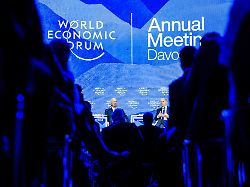More appearances than reality?
“Davos is a fair of vanity”
By Andrea Sellmann and Mary Abdelaziz-Ditzow
01/14/2023 09:03 am
Preparations for the 53rd World Economic Forum are underway in the Swiss mountain village of Davos. Does the summit help to solve the central problems of our time? The German-Swiss economics expert Will says no. He calls for more “edge”.
High in the Swiss Alps, Davos is getting ready for the onslaught: Shops are becoming company representative offices, hotels are fully booked, because the 53rd World Economic Forum starts in the spa town on Monday. Almost 2,700 politicians, business leaders and representatives of civil society have announced their attendance. The German-Swiss economics expert Markus Will will not be there this year either. Because for him the meeting is a “vanity fair”.
Will is convinced that for many participants it is good manners to travel to Davos. However, solutions for the major geopolitical and economic policy problems would not be developed, “even if there are a lot of important people there,” he complains in the podcast “Wirtschaft Welt & Weit”. For him, the World Economic Forum needs to become much more diverse and controversial. It is not enough to invite individual activists. But he would very much like to see the Chinese head of state Xi Jinping discussing it with one of the corona uncoverers.
Erwin Bollinger, Ambassador to the Swiss State Secretariat for Economic Affairs SECO, has a different view of the World Economic Forum. “Of course, Davos cannot solve the world’s problems on its own,” he says. The event is privately organized and has no decision-making authority. He therefore welcomes the exchange and is happy when ideas are launched in Davos that may not lead to a result immediately, but only later.
Bilateral on the edge
This applies to both large and small: Because Davos is not only a stage for heads of state and companies, but also offers space for bilateral negotiations. Bollinger, who is responsible for bilateral trade relations at SECO, expects talks between Swiss federal councilors and German politicians. Both countries are strong trading partners and have close economic ties to each other.
In 2021, German companies exported goods worth over 60 billion euros to Switzerland. Imports during this period were around 50 billion euros. It is often the same groups of goods that the neighbors trade in. In the case of Germany, cars stand out, in the case of Switzerland, luxury watches and precision tools, which are required in the car industry, for example. Switzerland’s pharmaceutical industry is also strong.
Collaboration in a fractured world
Bollinger knows that 63,000 people cross the German-Swiss border on their way to work. There are also 313,000 Germans who have settled in Switzerland. This also includes Markus Will, who has also acquired Swiss citizenship since 2011. Above all, the cooperation between Switzerland and Baden-Württemberg is a “perfect example of economic trade integration”, which goes far beyond that thanks to the lack of language barriers and cultural proximity.
The relationship between Germany and Switzerland is only a positive side note, because in Davos the focus is on “Cooperation in a fragmented world”. The Ukraine war and sanctions against Russia have exacerbated the energy crisis, which in turn is undermining efforts to combat climate change. And it is important to avoid a global recession. The starting position in 2023 is therefore difficult. Klaus Schwab, the founder of the World Economic Forum, recently put it in a nutshell: “It’s not surprising that we’re all stuck in a crisis mentality.”
What does Germany have to do in order to still play an important role in the economic world of tomorrow? Who are we dependent on? Which countries benefit from the new world situation? Mary Abdelaziz-Ditzow discusses this in the ntv podcast “Wirtschaft Welt & Weit” with relevant experts.
You can find all episodes in the ntv app or wherever there are podcasts: at RTL+ music, Apple Podcasts, Google Podcasts, Spotify, Amazon Music or deezer. For all other podcast apps, you can use the RSS feed.
